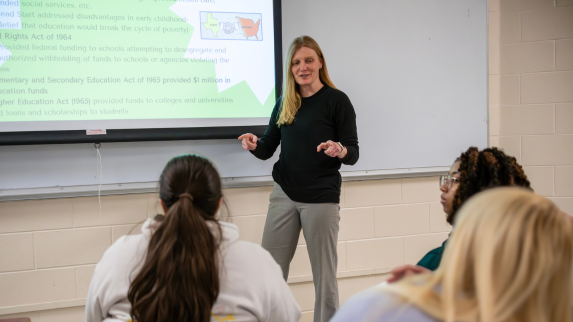Experimental Gaming Meets Critical Theory
Deep in the intersection of digital storytelling and critical theory, Frank Schuenemann, a second-year MA student in the English and Media Studies program, is crafting an interactive Twine game that disrupts traditional ideas of player agency and narrative structure. Twine, an open-source tool for nonlinear storytelling, allows players to navigate a web of linked passages where choices shape the story’s outcome. Unlike conventional games with fixed objectives, Twine games emphasize experimental storytelling, player-driven exploration, and alternative narrative forms.
Frank’s project draws from Legacy Russell’s Glitch Feminism: A Manifesto, incorporating a posthumanist approach to digital identity, disruption, and resistance. Central to his work is the concept of refusal—encouraging players to question participation, reject conventional gameplay mechanics, and embrace the subversive potential of glitch. By integrating elements of RPG (role-playing game) narratives—where players assume a role and make choices that influence the unfolding story—Frank’s project invites deeper engagement with the relationship between interactivity, agency, and control in digital spaces.
Dr. Claire Stricklin, the Graduate Program Director for Emerging Media/Digital Studies, serves as Frank’s advisor. Their shared enthusiasm for Twine and RPG storytelling, along with Dr. Stricklin’s extensive background in interactive and hybrid narrative structures, provides Frank with a strong foundation to refine both the conceptual and technical dimensions of his work.

Related to this Story:
Crafting Stories, Analyzing Media: Explore the MA in English and Media Studies
Dive into the dynamic world of the Master of Arts in English and Media Studies at Rutgers University–Camden, where literature, culture, and digital media converge. This interdisciplinary program equips students with the skills to critically analyze texts, media, and cultural narratives while fostering creativity and research expertise. With courses spanning literary traditions, media analysis, and a unique focus on diversity, including topics like race and gender, the program prepares graduates for impactful careers in academia, publishing, and beyond. Plus, the vibrant Rutgers–Camden Writers House offers an inspiring space for creative growth through workshops, readings, and events, making this program a hub for innovative thinkers and storytellers.
Master the Tools of Tomorrow in Emerging Media
In today’s rapidly evolving digital landscape, proficiency in emerging media is essential. Rutgers University–Camden offers two innovative graduate programs—the Master of Arts (M.A.) and Master of Professional Studies (M.P.S.) in Emerging Media/Digital Studies—designed to equip students with practical skills in digital media production, fluency across multiple software platforms, and a deep understanding of the cultural impact of digital media. Through a transdisciplinary approach, the curriculum encompasses digital storytelling, interaction design, and ethical considerations, preparing graduates to lead and innovate in the dynamic fields of media and communication.
Spotlights & Stories

Want more stories like this? Spotlights and Stories highlights alumni, faculty, staff, and student experiences through stories, video, and voice. Learn more
Explore Graduate School Programs

Rutgers Graduate School-Camden offers 20+ graduate certificates, master’s, and doctoral programs across various disciplines, including biology, data science, creative writing, and psychology. We take pride in our academic diversity. Learn more
Former Students, Get Involved

Stay connected with Rutgers-Camden! Engage with former students, attend events, and support current students. Your involvement strengthens our community and helps shape future success. Learn more
